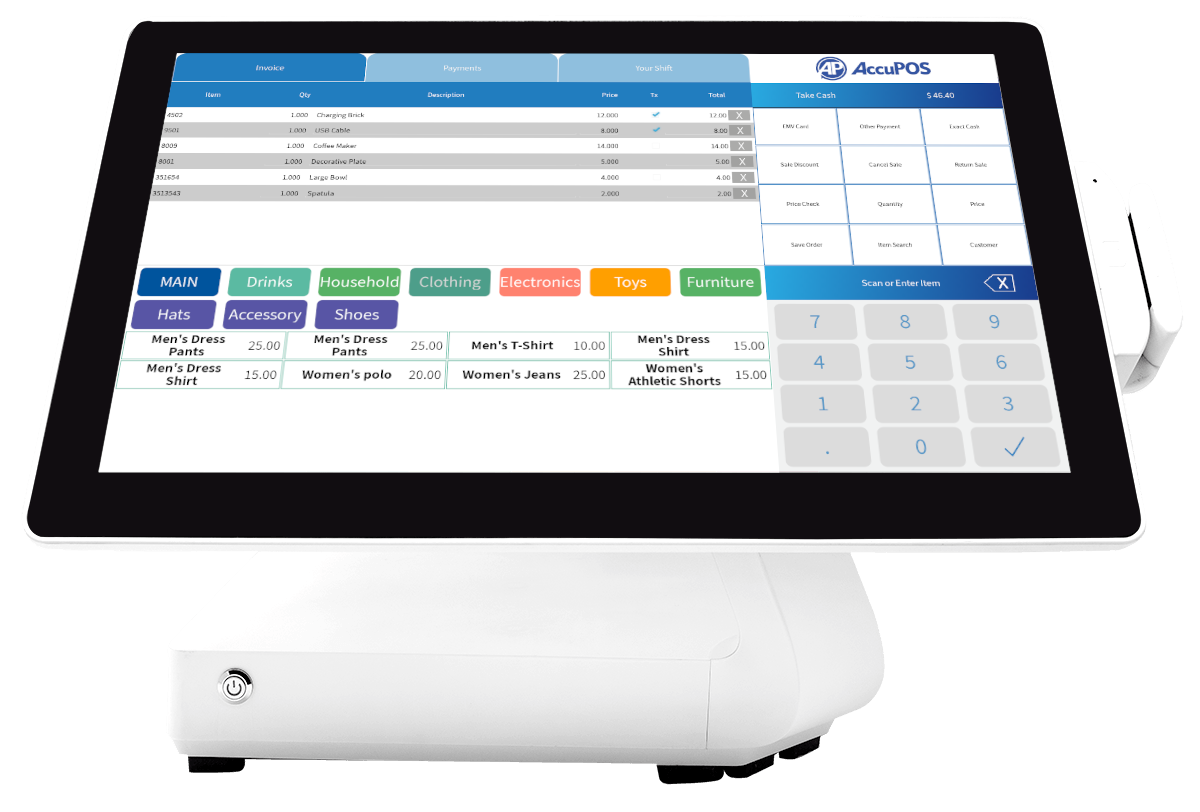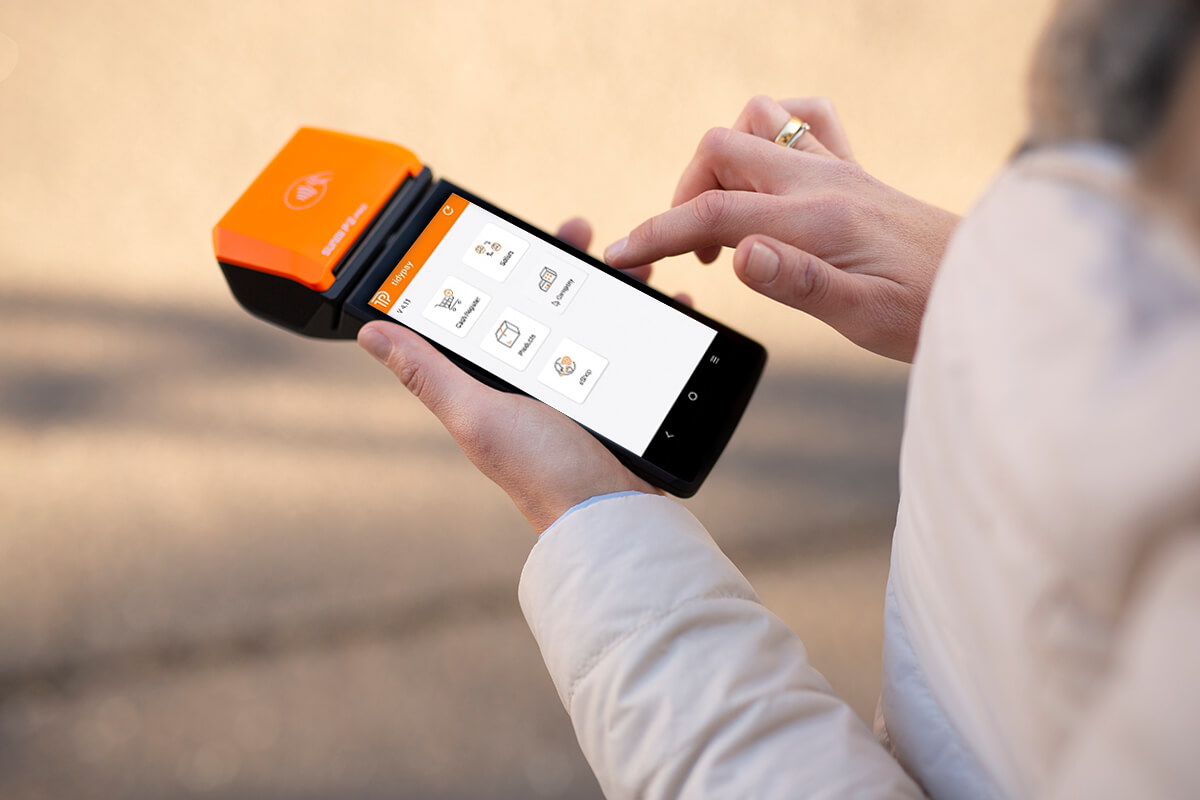What Does Restaurant Pos Mean?
What Does Restaurant Pos Mean?
Blog Article
Point Of Sale Systems - An Overview

Point of Sale Systems: Retail Point-Of-Sale Solutions Streamline Deals
All About Pos System For Small Business

Hardware Parts of a Point of Sale System What makes a POS system tick? It's not just software application; the hardware plays a starring role. Consider it as the get more info body to the software's brain. Without the best hardware, even the most sophisticated POS software is simply a pretty face. Essential POS Hardware So, what are the must-haves? Let's simplify. The central processing unit, typically a computer system or tablet, is the heart of the operation. The monitor or touchscreen display enables personnel to engage with the system. A barcode scanner accelerate the checkout procedure. Keep in mind the days of manually getting in each code? The reliable receipt printer offers customers with a record of their purchase. A money drawer keeps your cash safe and organized. A card reader enables clients to pay with credit or debit cards. Diving Deeper: Beyond the Basics But wait, there's more! Depending on your service, you might need specific hardware. For example, a dining establishment may incorporate kitchen printers to relay orders, while a store may use label printers for item tagging. Ever question how your local bakery immediately prints those delicious-looking labels? Choosing the Right Hardware: A Balancing Act Picking the best hardware isn't just about purchasing the most costly equipment. It's about finding the sweet area between performance, durability, and budget. A little organization just beginning may go with a more standard setup, while a high-volume merchant will require robust, high-performance devices. Is it much better to buy new or used? Consider your options carefully. A brand-new system provides the current innovation and warranty security, however a refurbished system can save you cash. The Future of POS Hardware What does the future hold? Expect to see a lot more integration with mobile phones, biometric scanners for worker authentication, and advanced analytics control panels showed on bigger, clearer screens. Think of a world where stock is immediately upgraded in real-time as items are scanned-- a world where you can track your very popular item from anywhere in the world. The possibilities are unlimited, and the hardware is constantly developing to fulfill the needs of today's organizations. Are you all set to update your point of sale system?
Software Characteristics and Capabilities: The Heart of Your POS System
Ever enjoy a skilled barista slide through a hectic morning rush? Their trick isn't simply caffeine; it's a smooth dance with their POS system. The software is the conductor of your business symphony, orchestrating whatever from sales to inventory. However what notes should you be listening for? What capabilities really matter in today's market?
Inventory Management: Beyond Counting Beans
Forget spreadsheets that haunt your dreams. Modern POS systems provide real-time stock tracking, alerting you when your stock of artisanal coffee beans dips precariously low. Think about it as a digital guardian angel, preventing those uncomfortable "Sorry, we're out!" moments to clients. What if you could likewise anticipate need based on historic data? Numerous systems now provide forecasting tools, a powerful weapon against overstocking and lost sales. This helps avoid the predicament of lacking popular items or building up excess stock of slow-moving products, both of which can constrain capital and area.
Sales Reporting and Analytics: Translating the Information
Sales data is the new gold, and your POS system is the miner. Forget simply understanding just how much you offered today. Dive deep into the information to discover trends, identify your best-selling products, and comprehend consumer habits. Which menu item pairs completely with the everyday special? Which promo resonated most with your clientele? These insights are not simply interesting; they're actionable intelligence. Without dependable sales reporting, browsing the intricacies of business decision-making becomes like sailing without a compass, increasing the possibility of mistakes and missed chances.
Customer Relationship Management (CRM): Structure Bridges, Not Walls
Remembering a routine consumer's name and favorite order is charming, but scaling that individual touch is difficult. POS systems with CRM abilities enable you to track customer purchase history, choices, and even birthdays. Imagine automatically providing a discount on their birthday-- a little gesture that fosters commitment and motivates repeat service. There is the prospective snag of bad data quality, which can lead to inaccurate customer profiles and ineffective marketing efforts.
Payment Processing: Improving the Deal
The checkout experience can make or break a sale. Seamless integration with various payment approaches-- charge card, mobile wallets, even copyright-- is non-negotiable. Can your system deal with split payments? Does it offer secure tokenization to secure consumer data? A clunky payment procedure is like striking a sour note in your organization symphony, potentially interrupting the whole efficiency. Guaranteeing compatibility with developing payment technologies and adherence to security standards are critical for preserving client trust and functional performance.
Worker Management: Keeping the Group in Sync
From clocking in and out to handling approvals and tracking efficiency, staff member management features improve operations and improve responsibility. Is scheduling a headache? Numerous POS systems offer integrated scheduling tools, optimizing staffing levels based on anticipated demand. A typical barrier that is often ignored is the difficulty of incorporating employee management performances with payroll systems, which can result in mistakes and inefficiencies in wage computations.
Advanced Characteristics: Leveling Up Your Operations
- Table Management: Perfect for restaurants, this feature permits you to imagine your dining space, track table status, and manage reservations.
- Loyalty Programs: Reward your best customers and motivate repeat business with incorporated commitment programs.
- Online Purchasing Combination: Flawlessly incorporate your POS system with online buying platforms to expand your reach.
Picking the right POS system is about more than simply functionality; it has to do with finding a partner that can grow with your company. Consider your current requirements, anticipate future development, and do not be afraid to ask the hard concerns. The best software application can transform your business from a chaotic cacophony into a harmonious work of art.
Industry-Specific POS System Applications
Consider the regional bakery, busy with morning clients yearning fresh croissants. A generic POS system might handle transactions, however can it manage complex dishes, track component stock, or automatically adjust production schedules based upon sales information? Probably not. That is where the beauty of industry-specific POS systems shines.
Restaurants and Hospitality
For bustling dining establishments, speed and accuracy are vital. The number of times have you seen servers managing orders, modifications, and splitting bills, all while attempting to supply excellent service? A restaurant POS system simplifies these processes, enabling for table management, kitchen area order tickets, and even online purchasing combination. These systems often consist of functions like ingredient-level stock tracking, essential for handling food costs and minimizing waste. Ever question why your favorite meal is sometimes unavailable? It may stem from an absence of correct inventory management.
- Table Management
- Kitchen Area Order Tickets
- Online Purchasing Combination
- Ingredient-Level Inventory Tracking
Retail Solutions
Retail, with its varied stock and customer interactions, demands a various set of tools. Imagine a shop clothing store having a hard time to keep an eye on sizes, colors, and seasonal collections using a fundamental checkout system. An industry-specific retail POS system uses features like barcode scanning, customer commitment programs, and in-depth sales reporting. These systems can even integrate with e-commerce platforms, offering a smooth omnichannel experience for consumers. Did you understand some retail POS systems can forecast future sales trends based upon historical information? Now that is effective!
The Hazards of a Mismatch
Selecting the wrong POS system can develop substantial functional difficulties. A clothing shop utilizing a restaurant POS, for example, would find it inappropriate for managing stock with sizes and colors. The lack of correct reporting and analytics could cause mistaken acquiring decisions and lost profits. The result could be similar to trying to fit a square peg in a round hole.
Secret Factors to consider
Selecting an industry-specific POS system requires mindful evaluation. Consider your service's distinct needs and operational workflows. Does the system integrate with existing software? Does it offer the necessary reporting abilities? Is it scalable to accommodate future development? A well-chosen POS system is not simply a transaction tool; it's a tactical possession that can drive effectiveness, improve consumer satisfaction, and eventually, improve your bottom line. Keep in mind, it is a financial investment in your organization's future, not just an expenditure.
Security Factors To Consider for Point of Sale Systems
Ever heard the tale of the mom-and-pop shop that lost whatever since of a single, neglected security flaw in their POS system!.?. !? It's a cautionary tale, and it highlights a critical aspect often eclipsed by the attraction of elegant functions and streamlined operations. The reality is, a POS system is just as great as its security. What great is a system that crunches numbers in a flash if it permits crooks to swipe client's information simply as rapidly?
The Vulnerability Minefield
The digital landscape is a battlefield. Every POS system, no matter size or elegance, is a possible target. Are you truly prepared for the risks lurking around the corner? The real pinch comes when you find that your outdated software has an open hole that hackers can exploit, turning your company into an unwitting accomplice in identity theft. The problem is that hackers are crafty and are constantly altering their strategies.
Common Security Gaps and Specialist Tips
- Weak Passwords: "Password123" isn't cutting it. Use strong, unique passwords for all POS system accounts and alter them regularly. Two-factor authentication is a must.
- Unsecured Networks: Your Wi-Fi resembles leaving the front door open. Protect your network with strong encryption (WPA3 if possible) and think about a separate network for your POS system.
- Out-of-date Software: Software vendors spot security holes all the time. Failing to upgrade resembles inviting problem. Set up automatic updates or schedule regular maintenance.
- Employee Training: Your personnel is your very first line of defense. Train them to acknowledge phishing attempts, protect passwords, and report suspicious activity.
Information Encryption: Your Guard Versus the Dark Arts
Consider information file encryption as a secret code. It scrambles delicate info, like credit card numbers, making it unreadable to unapproved users. Without file encryption, your customers' monetary details are like sitting ducks, ripe for the picking by cybercriminals. It's not practically securing your consumers; it has to do with safeguarding your track record and preventing hefty fines.
PCI Compliance: The Rulebook You Can't Ignore
If you accept charge card, you're bound by the Payment Card Industry Data Security Requirement (PCI DSS) It's a set of security standards designed to safeguard cardholder information. Failing to comply can result in fines, charges, and even the loss of your capability to process credit card payments. It's a headache, yes, but it's a necessary one. Believe of PCI compliance as the cost of doing service in the digital age.
Consider this: every transaction processed through your point of sale is a potential entry point for harmful actors. By carrying out robust security steps, you're not just safeguarding your company; you're safeguarding your consumers' trust and guaranteeing the long-term practicality of your operations. The security of your POS system isn't simply a technical problem; it's a service imperative. It needs continuous watchfulness, proactive procedures, and a dedication to staying ahead of the curve.